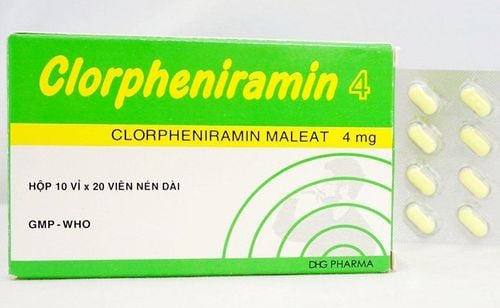Allergies are the body's reaction to harmful or irritating foreign substances, leading to symptoms such as rashes, hives, itching, diarrhea, etc. In such cases, taking allergy medication to "soothe" the immune system is very beneficial. So, how long does it usually take for allergy medication to take effect?
1. The body's allergic reaction
Basically, allergy symptoms are the result of an overactive immune system, mistaking a harmless substance (often pollen or animal dander) for something more dangerous (like germs or viruses) and launching an attack.
When exposed to an allergen, the immune system releases histamine, which binds to receptors on other cells. Once attached to the receptor, histamine causes those cells to swell and leads to inflammation.
Antihistamines (also known as anti-itch or anti-allergy medications) work by blocking histamine from affecting these cells.
By taking allergy medication early, patients can prevent inflammation and allergic reactions from occurring, as antihistamines can block histamine from binding to its receptors on cells, preventing allergy symptoms or making them milder. However, if patients take the medication after allergy symptoms have already appeared, histamine has already bound to the receptors and triggered the inflammatory process.
2. How long does it take for allergy medication to take effect?
Anti-itch or anti-allergy medications belong to the antihistamine group. Both cetirizine and loratadine are antihistamines that do not cause drowsiness for most patients.
Antihistamines are known for causing drowsiness because they can easily enter the central nervous system and directly affect the user's alertness. However, newer generation antihistamines tend to cause fewer side effects. When patients experience severe allergic reactions that leading to uncontrollable sneezing, watery eyes, and impaired vision, taking allergy medication can significantly improve symptoms. So, how long does it take for allergy medication to take effect?

Among the active ingredients in anti-allergy medications is Loratadine, which is widely used and effective in improving allergy symptoms within 1-3 hours, reaching its peak effectiveness after about 8-12 hours. The medication typically lasts for 24 hours in most patients, so it is taken once a day. Although the medication does not provide quick pain relief like some antihistamines, Loratadine does not cause drowsiness in most people and is suitable for daily use. Loratadine has a long-lasting effect. While most people experience relief at least 24 hours after a single dose, Cetirizine works quickly. In this case, users may feel relief within just 1 hour after taking the medication.
3. Side effects of taking allergy medication
Cetirizine and Loratadine are antihistamines with few side effects and are recognized as safe for most people. However, any medication can have side effects, and anti-itch or anti-allergy medications are no exception. Cetirizine may cause drowsiness in a small number of users. The manufacturer recommends that patients use it when they have plenty of time at home to prevent drowsiness. Loratadine causes less drowsiness than Cetirizine when used at the recommended dose. Some mild side effects of taking allergy medication include:
- Headache
- Feeling drowsy or tired
- Dry mouth
- Sore throat
- Dizziness
- Stomach pain
- Red eyes
- Diarrhea or constipation
Some more serious side effects may occur but are very rare. If users experience any of the following signs, they should seek medical help as soon as possible:
- Swelling of the lips, tongue, face, or throat
- Difficulty breathing
- Rapid or irregular heartbeat

Children may experience side effects similar to adults, but in addition to unwanted effects, children taking antihistamine allergy medication may become irritable, restless, or have difficulty sleeping.
Pregnant women or those planning to become pregnant should consult their doctor before using Cetirizine and Loratadine. Although these two medications have not been reported to pose risks or cause birth defects during pregnancy, doctors recommend not using any medication during pregnancy unless the benefits outweigh the potential harm.
Studies have shown that Loratadine enters breast milk in very low amounts. Although it may cause drowsiness, when used at the recommended dosage, this medication is unlikely to cause side effects in breastfeeding infants.
However, like other antihistamines, Loratadine affects secretion and may reduce milk supply. Therefore, it should only be used at the lowest dose if breastfeeding.
It is best to consult a pharmacist or doctor when considering taking allergy medication. Using the right m edication at the correct dosage always results in effective and safe treatment for the patient's health.
Reference source: healthline.com - usarx.com - webmd.com
To arrange an appointment, please call HOTLINE or make your reservation directly HERE. You may also download the MyVinmec app to schedule appointments faster and manage your reservations more conveniently.







